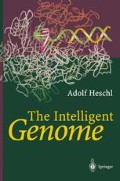Abstract
The outcome of our evolutionary considerations of the cleverest of all the apes can be formulated briefly and succinctly: the fictitious wonder of nature the human being is dead or, more realistically, never existed except in our imaginations. The creature Homo sapiens, however, with all its wonderful, and to some extent strange illusions and fictions lives on and is still evolving today exclusively according to the universal principles of the biological evolution of living things which means by the method of random genetic mutation and concurrent natural selection. The special thing about this statement above all is that a critical epistemology and the modern synthetic theory of evolution can support each other in the conceptual corroboration of this diagnosis (Heschl 1993c). The most important contribution to epistemology consists of the insight into the fact that cognitive gain by the human subject in the course of his ontogeny is impossible, since the latter, for inherent systemic reasons—as a rule somatic mutations are disadvantageous (Knippers 1997, p. 232)—must remain excluded from any adaptive changes. In other words, the personal individual development is exactly like the embryonic development or epigenesis (see special issue of Science 293, 1063–1105)—this latter term comes from the developmental theory of C. F. Wolff in 1759, a time when naïve minds still imagined homunculi, i.e., small manikins, in the fertilized egg cells—namely a process controlled in smallest detail by the just all-knowing intelligent genome (see Shubin, Tabin and Carrol 1997).
If we are to understand evolution, we must remember that it is a process which occurs in populations, not individuals. Individual animals may dig, swim, climb or gallop, and they also develop, but they do not evolve. To attempt an explanation of evolution in terms of the development of individuals is to commit precisely that error of misplaced reductionism of which geneticists are sometimes accused.
John Maynard Smith
Access this chapter
Tax calculation will be finalised at checkout
Purchases are for personal use only
Preview
Unable to display preview. Download preview PDF.
Author information
Authors and Affiliations
Rights and permissions
Copyright information
© 2002 Springer-Verlag Berlin Heidelberg
About this chapter
Cite this chapter
Heschl, A. (2002). Requiem for a Wonder of Nature. In: The Intelligent Genome. Springer, Berlin, Heidelberg. https://doi.org/10.1007/978-3-662-04874-0_20
Download citation
DOI: https://doi.org/10.1007/978-3-662-04874-0_20
Publisher Name: Springer, Berlin, Heidelberg
Print ISBN: 978-3-642-08648-9
Online ISBN: 978-3-662-04874-0
eBook Packages: Springer Book Archive

